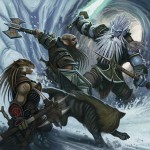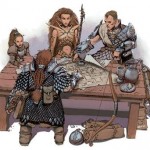![]() Wish your D&D game ran a little smoother? Especially during combat?
Wish your D&D game ran a little smoother? Especially during combat?
Sometimes – or often – turns lag with all the tactical richness that 4e offers. You have a lot of choices in the moment to make. And more than ever, teamwork is rewarded in D&D. So it helps to think of your allies before, during, and after your turn. Make this the good habit that it is, and you’ll find your playgroup’s turns moving along a lot more smoothly. And smoother combats mean more time to ensure the precious balance of storytelling and game that has always been D&D remains intact throughout your game sessions.
Tactical Awareness
How many free, immediate and opportunity action powers have you forgotten or missed in the chaos of battle? Or this or that hit bonus, damage bonus, or other temporary modifier? If you’re like me, your fair share. There’s a lot going on, and every little bonus or penalty adds up – and everything you do impacts not just you, but your entire party too.

For example, your melee is going to want flanking opportunities to gain combat advantage as much as possible. Flanking is one of those mechanics that requires help – a teammate. You could say the same thing about many free actions and almost every immediate and opportunity action. That help is usually some sort of combat situation or trigger and it’s important you be on the lookout for that “help,” both in and outside of your turn. Your allies, your friends, are counting on you!
Consider sports teams. Better yet, consider a few of the arguably greatest and winningest sports teams either in the past decade or all-time: The New England Patriots and Boston Celtics. A huge reason for their team success is that each individual:
- Recognizes he must strive to excel in his role to best help the team
- Values his teammates’ abilities, talents and contributions
- Assists and supports his teammates for the team to reach maximum success
There’s this awareness in great sports teams, and if your D&D playgroup has something like that, you’re going to play very efficiently together and have a lot of success together. “Together” has big meaning in sports, and if you pay attention, you’ll often hear Doc Rivers, coach of the Boston Celtics, urge his team to play “together” in those team huddle live bites.
Why? Because it’s also all about teamwork in D&D 4e. It’s all about recognizing situations, valuing everyone’s talents, and helping eachother not just be better, but in the case of champions, achieve greatness. The Celtics play to win basketball games and add to their championship legacy, while you play out D&D combats to achieve victory and glory – not so different, are they?
Now sure, D&D and RPGs always are about teamwork to some extent, but the tactical strengths of D&D 4e’s combat system, highlighted by its myriad applied conditions (stun, daze, etc.) and power riders (additional situational bonuses), mean it’s critical to be a good, aware teammate when the blades start ringing and spells start flinging.
Tactical Drawbacks
So with all this tactical richness comes a cost: risk of information overload, analysis paralysis and time-consuming combat encounters. That also means less time for other important parts of D&D: noncombat encounters (social interactions, riddles, puzzles, traps, etc.), exploration, and advancing the story. It’s something you need to consider as a player – it’s not just up to the DM to create a balanced D&D experience.

Ask yourself, what can you do to increase your tactical awareness? How can I get faster on my turn? How can I make smarter decisions on my turn? These simple questions might bring you to trying practical solutions such as visual game aids, or character-oriented solutions like taking more direct and straightforward powers and feats that don’t have a huge wall of text of conditions and triggers.
Whatever your solutions, ask yourself: “How can I be a better teammate?” That’s what the great ones – in any context – ask, all the time. One way to go? Start simple and easy with an index card and use it exclusively for tracking special and temporary combat modifiers, one for each or all combats.
Experiment with these ways to increase your turn speed and your tactical awareness, so you can help both yourself and everyone else at the table save session time and excel tactically together. In short, that’s what makes you an awesome teammate in D&D combat; one of the absolute best compliments you can get in team sports or from your friends at the table after a blood-pumping epic battle.
Feel like a tactical master yet? You’re on your way! Here’s more ideas and a few easy, simple game aids you can easily use right now. I go to these guys often for help and ideas as both a DM and player when it comes to amping up my own D&D game, and you should too!
The Speed of Choice: the Real Reason your 4e Fights are so Damn Slow @ At Will
Three Cheap 4e Game Aids @ Sly Flourish
This article rings so true. Teamwork is all too important in 4e, as any other game. We’re playing a backup game of Death Watch, and it’s kind of hard to get into the team/squad mode. That’s a detriment for us, especially since Death Watch is damn deadly. I guess we’ll get better as we become more acquainted with our characters and the rules. It’s just frustrating in the mean time.
Tourq, I just watched the Deathwatch RPG video and I was quite impressed. Squad mode sounds like an innovative way to highlight the benefits and importance of tactical teamwork. Keep me posted on how your squad mode play goes, it sounds extremely cool and I’m sure you guys will hit your stride. Thanks for your comment!
Great post! This is solid advice for new and non-tactical players.
When I play, I try to get the most juice out of every turn. So, my turns end up taking longer because I try so many possibilities. Perhaps I should cut 50% out of my turn it spend that effort on helping team members with theirs.
Johnn, yes, it’s a fine line ultimately between maximizing your turn, helping your teammates out and keeping the gameplay smooth for everyone’s benefit. The most important thing is to keep searching for the right balance between those three. Thanks for your comment!
[…] It’s important to understand the nature of curative or protective magic and potions has changed in 4e. While you’d pack sometimes half-a-dozen or more of potions of cure light/moderate/serious, etc. wounds in the past, and the cleric would pray for just as many each day, there’s no longer fire-and-forget stockpiles of healing magic. The greatest strength of D&D 4e is its wealth of meaningful tactical situations and choices. […]
[…] Teamwork. I love the true team-play that D&D 4e encourages and rewards. There’s an opportunity for everyone to really help their allies in a fight, whether offensively, defensively, or otherwise, through plenty of tactical options and powers. […]
[…] Combat Mastery: Tactical Awareness & Teamwork 101 […]
[…] Combat Mastery: Tactical Awareness & Teamwork 101 […]
[…] football! And since I love both that and D&D – and the fact that there’s a lot of similarities between team sports and RPGs, and especially D&D 4e – here’s a fun poll question for all of […]
[…] friendly little buffs and class feature or feat triggers you have without your head exploding. A simple index card for each session or encounter is a great option as your Combat Card or Buff Cards. Another big […]
[…] to know more about about teamwork and tactics in D&D? Look right here if you haven’t […]